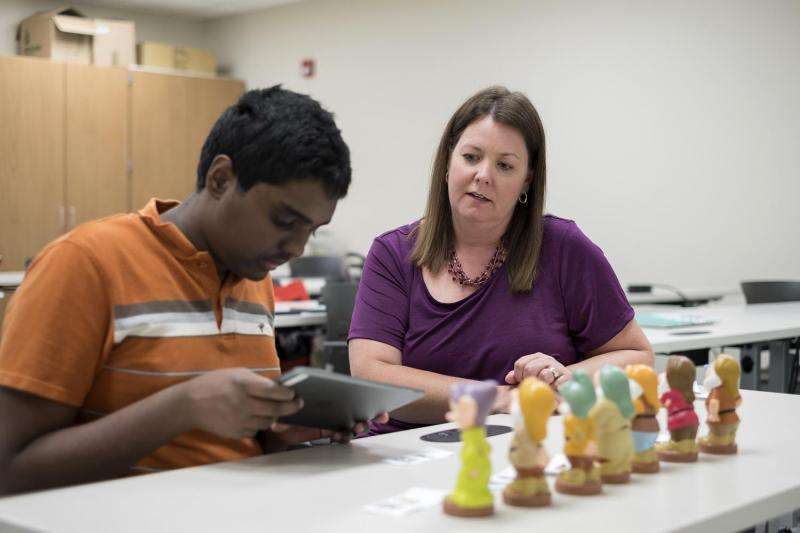Startup develops engaging, interactive way for kids with autism to improve comprehension

A Purdue-based startup is developing educational mobile applications designed as instructional tools to help people with special needs learn new or difficult skills. The company's first product is an app that could help children with autism read, understand and spell words in a more customized, engaging and rewarding way by using printable labels.
Nancy Rasche, a clinical assistant professor in Purdue's Polytechnic Institute, founded the company Experience Design Group LLC, to further commercialize her technologies. The company's first product is named Literacy Labels.
"While researching autism I was particularly interested in areas of instructional need, and one of those areas is literacy and comprehension," Rasche said. "Children with autism tend to be very good at decoding words but a lot of the time they don't fully understand the content. These children really need literal teaching so they can connect the orthography of the word to the actual meaning before they start decoding, and thus develop a better overall understanding."
Literacy Labels facilitates the learning of new words with an innovative technique of combining expressive and receptive language skills while scanning QR codes on printed labels.
"Our app requires minimal setup by having the user print and stick labels on certain objects in their environment. When a child scans the QR code on the label, the app will say the word they just scanned and spell it out. The app will give the child a chance to say the word and spell it as well, and then they can move on to the next one," Rasche said. "The app can be worked in different ways such that it could be directed by an educator who's telling the child to go find a certain object to scan, or depending on the child's education level, they could place the label on the correct object themselves, and then scan it."
Rasche said users also have the option to create their own labels.
"Sometimes it's better to start working with certain items that will get the child engaged and excited, maybe their favorite group of toys or animals, and then progressively move on to the more general and practical words," she said. "Or if a parent wants to teach their child vegetables, they're able to create and print more labels and do so. We're excited to be able to provide a customized app that can allow freedom in what is being taught."
Literacy Labels has additional features such as games, multiple levels and users can implement reward systems.
"The first game in the app starts with the home, showing rooms such as the kitchen, bedroom and bathroom. Children are able to go into those rooms and touch an object and then hear, spell and understand the word of the object they just touched," Rasche said. "There is also a seek and find feature where the app might tell the child to touch the night stand, and the child would have to touch the graphic representation of the night stand on the screen to get it correct. Kids also have an option to use the explore feature where you can touch anything in the room and it will give them the word and it also has different levels that kids can work up to."
Technology used by Experience Design Group LLC has been licensed through the Purdue Research Foundation Office of Technology Commercialization. Experience Design Group is a member of the Purdue Startup Class of 2016. Purdue has 27 startups based on Purdue intellectual property that were launched in the 2016 fiscal year.
Rasche said the app can target different learning areas depending on the child's needs.
"Although this app was created with children with autism in mind, it actually works really well with typical developmental preschoolers. It's very engaging and kids have a chance to get up and move around, all while learning," she said. "Since kids with autism are at all different levels of learning it really depends on the specific user how they decide to use the app. We wanted to make sure we have many different options so it could be valuable to as many people as possible."
The company tested the app with an older student who is diagnosed with moderate to severe autism.
"In our student's case, he's 13 years old and already reads so our app was able to help him with expressive language skills opposed to word recognition and comprehension skills that the younger children might need," Rasche said. "He did very well with the app, and you could see he was engaged and enjoying himself, so that was a great success."
Experience Design Group plans to further develop Literacy Labels by introducing more features and new educational applications in the future.
"We are working on a higher-level spelling activity, so if a child picks an object they will have to spell it correctly on the app instead of just repeating it out loud," Rasche said. "The company also is researching helping young adults with autism find areas of employment suited to their skills and interests, and one of those areas is software development. I'd like to develop a framework that could help them learn coding and find employment in this field. This plan would also require a framework for companies to hire young adults who are on the spectrum, give them an incentive to do so, and provide best practice guidelines for employing someone with special needs."


















